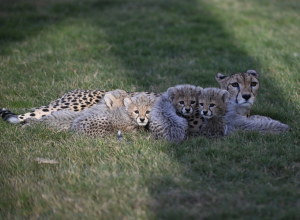— Dr. Gabrielle Rushing, the CSNK2A1 Foundation Science Program Director
SAN FRANCISCO, CA, USA, December 29, 2023 /EINPresswire.com/ — CSNK2A1 Foundation, a leading rare disease organization, is thrilled to announce the award of a research grant to the University of Utah’s Department of Human Genetics, led by Dr. Clement Chow, to further the understanding of Okur-Chung Neurodevelopmental Syndrome (OCNDS).
First described in 2016, OCNDS is an ultra-rare genetic syndrome caused by a mutation on chromosome 20 in the CSNK2A1 gene. OCNDS affects every aspect of life, with symptoms ranging from mild to severe and can include the inability to speak or delayed speech, global developmental delay, epilepsy, autism spectrum disorder traits, behavioral challenges, hypotonia, feeding difficulty, and severely disrupted sleep pattern. To date, there is no treatment for OCNDS.
Dr. Chow’s groundbreaking research will utilize a Drosophila (fly) model of OCNDS to conduct small molecule repurposing screens using libraries of FDA-approved drugs. Harnessing the power of the Drosophila model, Dr. Chow aims to expedite the transition from the laboratory to the clinic, reducing the time required for this critical process compared to other models.
“By using the Drosophila model, we have the unique opportunity to expedite the identification of potential treatments for OCNDS,” says Dr. Clement Chow. “This model offers significant advantages in terms of quick turnaround time and cost-effectiveness, enabling us to bring promising therapies to patients much faster.”
The Chow Lab’s primary focus is to gain a comprehensive understanding of how genetic variation influences disease outcomes. By employing novel quantitative and functional tools across various model organisms, they strive to unravel the intricate relationship between genetic variation and fundamental cellular traits that play a vital role in human health. Their work using model organisms will serve as a crucial foundation for modeling and informing future studies on genetic variation within the broader human population.
“We are excited to provide Dr. Chow with the grant award,” says Dr. Gabrielle Rushing, the CSNK2A1 Foundation Science Program Director. “His innovative approach using the Drosophila model and repurposing existing FDA-approved drugs holds tremendous promise. We believe that this study will significantly advance our understanding of OCNDS and pave the way for more targeted and efficient treatments.”
The CSNK2A1 Foundation remains steadfast in their commitment to innovative research, and this research award signifies yet another major step forward in their mission to transform the lives of individuals affected by OCNDS.
About CSNK2A1 Foundation:
CSNK2A1 Foundation is focused on finding a cure for Okur-Chung Neurodevelopmental Syndrome and ensuring affected individuals have the opportunities and supports necessary for happy and full lives. CSNK2A1 Foundation is a 501(c)(3) non-profit organization operated and funded by a committed team of volunteers, advocates, and researchers. To date, the Foundation has registered over 210 individuals with OCNDS in its patient registry worldwide. www.csnk2a1foundation.org
Chow Lab:
Chow lab is focused on understanding the role of genetic variation on disease outcomes. We employ quantitative and functional tools, in a variety of model organisms, to study how genetic variation impacts basic cellular traits important to human health. Our work in model organisms will help to model and inform studies of genetic variation in the human population. We hope to identify variation that can lead to more precise, personalized therapies, especially for rare disease. www.chowlab.org
Jennifer Sills
CSNK2A1 Foundation
+1 (415) 483-2488
email us here
Visit us on social media:
Facebook
Twitter
LinkedIn
Instagram
YouTube
![]()
Originally published at https://www.einpresswire.com/article/677509149/csnk2a1-foundation-funds-innovative-research-in-the-chow-lab-to-expedite-potential-treatments-for-ocnds




